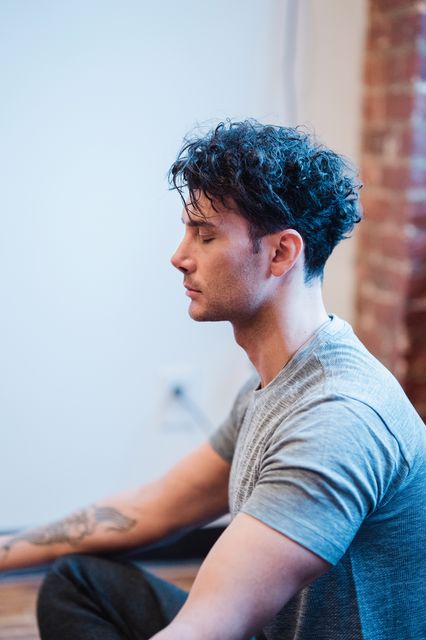
The word, present, has a double meaning. Present, as in present tense, the here and now. Present, as in being aware of what is happening in the moment. All religious and spiritual traditions talk about the importance of being present in the here and now. In my work as a counselor, I work with people to help them be present, to be aware, to be accepting of what is happening in their lives. I teach them how to practice this acceptance even in the presence of difficulties like anxiety, depression, stress, or trauma.
Acceptance and being present is not the same as resignation or taking a stance that “this is the way it is and there is nothing I can do about it.” In fact, with honest acceptance, you gain the information and insight you need to deal with whatever is happening to you.
As a spiritual practice, being present means recognizing that God is moving through the everyday activities of life, no matter how simple or trivial they may seem.
We can look at the daily events of our lives as a list of things to do or tasks to perform. We do them because, well, they are on the schedule for us to get accomplished so we can check them off our list. But we can also find ways to develop the stance and the awareness that God is present in any activity, any encounter, any moment of our lives.

Several years ago, I was having a conversation with my spiritual mentor. We were talking about the significance of Jesus’ life and teachings. In Jesus, we have a man who in just 1-3 years of ministry, through his words and actions, was able to offer the world a life of meaning and abundance. As we spoke, my mentor asked me, “Gary, what do you think Jesus spent most of his time doing during those days of ministry?” I gave the usual answers, “He was teaching, preaching, healing, leading his disciples.” He replied, “No, not really. During his ministry, most likely, he spent most of his time walking. What we read in the gospels is what Jesus did when he arrived somewhere. But a large percentage of his time, he was walking from one place to another.”
It is an insight I have never forgotten. Here is a man who changed the course of history with his words and his actions. And yet, during this life-changing ministry, he spent most of his time walking. It made me realize that there was something happening in the walking that made the difference. In his walking, Jesus was being present to God in the simple, ordinary moments of life.
As I often say to my clients, being present in the now is simple, but it is not easy.
There is a simplicity to being in the present moment. This moment, no matter what it contains, is really all we have. But we complicate our lives by living in the past or living in the future. A few weeks ago, I was working with a client who was dealing with several stressors in his life. As we were talking, he realized that when he felt the presence of the stress, very quickly, almost without being aware of it, he would have the thought, “I wish it wasn’t this way. I wish this wasn’t happening.”
“I wish it wasn’t this way” took him to the past, with the regrets for what he may have done to contribute to the stress he was feeling in the moment. “I wish this wasn’t happening” took him to the future, where he had expectations of how he wanted it to be. When he was able to be present with the stressors and his thoughts and feelings about the stressors, he was able to see more clearly the events in his life and choose responses that were connected to his faith and his meaning.
Spiritual director Anthony de Mello put it this way, “The present moment is never unbearable if you live in it fully. What is unbearable is to have your body here at 10 a.m. and your mind at 6 p.m.; your body in Bombay and your mind in San Francisco.”
What are some ways to develop the spiritual practice of being present?
1. Practice the presence of God.
Brother Lawrence (1614-1991) worked for many years as a cook in a monastery in Paris. In his writing, The Practice of the Presence of God, he developed the idea that every moment is important because it gives a chance to have a conversation or encounter with God. “It is not necessary to have important things to do,” he said, “I flip my omelet in the frying pan for the love of God.”
Like Jesus walking and Brother Lawrence flipping his omelet, we can make ordinary moments that are just part of the routine of the day into moments where we practice being present. Think about standing in line at a store or sitting at a stoplight. Instead of becoming bored or impatient, we can intentionally look around us. Look at the faces of the people around us. Look outside your window and look at a tree or a sign. What, really, do you see? How might God be present in this moment?

2. Be aware of the language of your thoughts.
Like my client with his stressors, sometimes, just being aware of how we are thinking about a situation can move us from the past or the future into the present. For a period of time, a day or a week, watch for signs that you are not really living in the present. Watch for phrases like “I could have…If only…I wish…I must…I have to.” Sometimes words are just words, but often they can reflect how we are living with the regrets of the past or the expectations of the future.
3. Stop watching the clock.
Yes, there are appointments that we have to keep, but there are moments during the day when we can free ourselves from the movement of the clock. There is a Native American story where someone ask an elder how long it will take to do a certain task. The elder answers, “As much time as is needed.” For some, part of their Sabbath observance involves spending the day without wearing a watch. They give themselves to an activity for as long as they want.
4. Ground yourself in the present moment.

One of the most basic mindfulness practices is mindfulness of breath. You put yourself in a comfortable position. You close your eyes, and you give your attention to your breath as it goes in and out of your body. If you are distracted by a thought, a sound, a feeling, or a physical sensation, you simply notice that you are distracted and return your attention to your breath. One of the reasons this practice is so helpful is that it grounds you in the present moment. Your breath and your body are never in the past; they are never in the future. They are always in the present.
5. Do a daily review to see moments where God was present.
The Ignatian tradition encourage a daily practice called the Examen. At some point, you go back through the events of the last 24 hours. You bring them to mind intentionally and slowly. As you hold each even in your mind, relive it, and look for ways that God was present, even if you weren’t aware of it at the time. Be thankful and celebrate that awareness; set an intention to be more open to that presence in the moments ahead. I began by describing the double meaning of the word, present. It can mean a moment in time, like the present tense. It can mean an awareness of what is happening right. But present can also mean gift. And there is no greater gift than the spiritual practice of being present.
